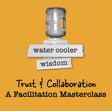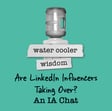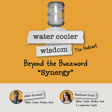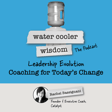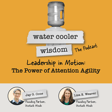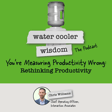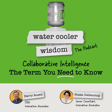The Cost of Unproductive Meetings
00:00:11
Speaker
It's a staggering fact that unproductive meetings are costing the United States a colossal $37 billion annually. So if your week was cluttered with less than stellar meetings, you're certainly not alone.
When Are Meetings Necessary?
00:00:23
Speaker
In today's episode of water cooler wisdom, we delve into the true cost of bad meetings beyond just the bottom line. We'll discern what crosses the threshold of meeting worthy versus sending an email. We'll discuss what it means to over collaborate
00:00:39
Speaker
And of course, we're going to equip you with the tips to enhance the value of your meetings.
Making Meetings Effective
00:00:45
Speaker
So tune in before your next meeting to discover how you can help buck the trend and make every meeting meaningful.
Meet the Hosts: Rachel and Jake
00:00:52
Speaker
Hi, welcome to Water Cooler Wisdom. I'm one of your hosts, Rachel Grail. And I am Jake Blogger. I'm so happy to have this meeting with you today, Jake, because we are talking about meetings today. Yes, I love meetings. Yes, this is going to be a great meeting.
00:01:10
Speaker
I didn't even mean to say that, it just came out. I've had too many meetings today, so my brain is frazzled. Yes, that happens. How do you feel about meetings in general?
Mixed Feelings About Meetings
00:01:22
Speaker
You know what? Good and bad. Sometimes I look forward to it, especially since, you know, we work fully remote. So there's like the, oh, I get to talk to another human being today versus my cat. So it's sometimes nice to have that. But then there's other times where, you know, you're like, oh, I'm dreading this meeting so much. I don't, I'm not ready for this. I'm tired. My brain is fried.
00:01:45
Speaker
Yeah. I feel similarly, I generally love collaborating with people and I am eager to connect with people, but then sometimes I have high hopes and my hopes are occasionally dashed when we get into the meeting. But I think that we've got a great guest to talk about this today.
Introducing Michael Reedy
00:02:08
Speaker
As you know, Michael Reedy is very well informed on this subject and I can't wait to hear what he has to say today.
00:02:15
Speaker
He can read a phone book and it's interesting to me, so it's great. It'll be a great conversation.
Rapid-Fire Guest Questions
00:02:21
Speaker
It will. Before we get to the conversation, I have for everyone listening, we have a new bit that we're adding to the end of every episode for each guest.
00:02:31
Speaker
And so it's going to be just a rapid fire question. And we'll start this with Michael today. But to really test it out, see how it goes, and to get to know each of us better, I thought we could do it on ourselves. Is that okay with you, Rachel? I love that. I think if we're asking our guests to do it, we should also share openly.
00:02:52
Speaker
Yeah. All right. So I'll ask the questions. We'll both answer. You can start and I'll do the second response. Sounds good. First up, coffee or tea in the morning? Tea. PG tips. Coffee, then 15 cups of it. What about early bird or night owl work style? Mostly early bird. I can get down with the night owl, but mostly early bird.
00:03:18
Speaker
I'm a wannabe. I'm a wannabe early bird, but realistically, I'm a night owl, unfortunately. Know thyself, Jake. Yes, yes. What about digital or handwritten for your to-do list? For work stuff, I do digital, but I do handwritten. Actually, I have a little thing called The Remarkable. It's like a digital notepad. Yes, I have that too. Yeah. Blending all worlds.
00:03:47
Speaker
Yeah, I mind sitting collecting dust somewhere because I don't use it anymore, but it's expensive. I just revived it in the New Year's, like, okay, let's write some New Year's resolutions in here. Yes. Yeah, for me, it's mostly digital, but sometimes I'll do a quick hand write that'll transfer to digital someday. Nothing like a good pen for some things. Oh, for sure.
00:04:13
Speaker
What about an app platform software, whatever it is that you swear by with work?
Productivity Tools Debate
00:04:19
Speaker
Yeah, I think I've been using chat GPT for a lot of little stuff lately. And it's just been really fun. It's opened up. It's opened up things. So lately, that's what I swear by. I agree. I love productivity. Yeah, I do the same thing. Oh, yeah. Yeah, you get don't get too comfortable with it.
00:04:39
Speaker
I think for me in marketing, it's HubSpot. And HubSpot does not sponsor this, but HubSpot, if you would like to sponsor this by all means, they are awesome. And yeah, they should pay me for how much I recommend them. What's about a book that has made a significant impact on you? There's so many. I had a hard time deciding, but I'll just say The Untethered Soul.
00:05:04
Speaker
Yeah, for me, probably Twilight. No, just kidding. It's not. Just kidding. It is not 100% not.
00:05:13
Speaker
No, it is not a promise.
Book Recommendations
00:05:17
Speaker
That's no shade for any Twilight lovers out there. Only a little, but no. I mean, I still read it. For me, it's hard. I read primarily fiction. I'm not the biggest fan of the coaching or self-help stuff. I just tend to
00:05:36
Speaker
think of all the things I'm doing wrong whenever I read those books and just get stuck there. So I don't know that I can actually answer it. I mean, I've read some really good books in the last few last year. What book would you recommend the novel that you would recommend I read? Oh, A Song of Achilles is a really good book. I've heard that's a good talk. Yeah, yeah, it took me a while to get into it. But then once I did, it's like, yeah, it's a solid book. Writing it down.
00:06:06
Speaker
Yes, I don't recommend the fourth wing. I finished my year on that one and people loved it. Sorry, I might get hate for that. Right. We're going to lose listeners today. Oh man. What about, speaking of podcasts, podcasts or music for background as you work?
Work Preferences: Music and Environment
00:06:26
Speaker
Honestly, most of the work that I do is so thinking heavy that I need to work in silence. It's a treat if I can put on some music. I do love that. Podcasts are more for like if I'm driving or walking. Love that.
00:06:42
Speaker
I agree, similar, like whenever I'm doing any writing or reading for work, I'll do lo-fi a lot and have some lo-fi playlist that there's no music, I just have something in the background. Yeah, we're gonna share a little lo-fi. Oh yes, I love it. I do some classical lo-fi, which was very interesting. Nice, maybe we can link some to the podcast so people can know what on earth we're talking about that are uninitiated.
00:07:12
Speaker
But if I'm doing some monotonous work where I don't have to think too much, it's just pushing things out, then a podcast or a good playlist is up my alley. Love it. What about work environment, remote or in-person?
Remote Work vs. In-Person Meetings
00:07:26
Speaker
Day-to-day remote. I do love being in-person with people and doing trainings and having meetings together, but for day-to-day remote.
00:07:36
Speaker
Yeah. And I know where you fall on this one. Yeah. If you just listen to episode one and you'll know exactly where I stand, but remote 150 billion percent. Introverts unite from our separate workspaces. Yes, please. But I will say I like the occasional get together with teams and seeing people in person, but 99% of the time remote. Agreed.
00:07:59
Speaker
All right, final and biggest question is if you can have a water cooler chat with anyone dead or alive, who would it be and why?
00:08:08
Speaker
Obviously, this is a hard question, but actually I chose this really quickly. It would be RuPaul. And the reason is because I am so inspired by the way RuPaul does incredibly meaningful work in the world, sets up a platform that launches other people, advocates for people, and does it all with such a sense of play and delight and confidence. I just, I'm endlessly inspired. What about you, Jake?
00:08:36
Speaker
You know, it was actually the same as RuPaul because, yeah, I mean, we knew this because yeah, we were both, we were talking about RuPaul before this. Yeah. So it's absolutely RuPaul for all the same reasons. I've been rewatching the rewatching episodes and I kind of like this a little bit better since I know what's happening, know the end results. I just kind of focus more on.
00:08:59
Speaker
the dialogue and those little moments he has with each queen of just like talking them up and little bits of wisdom that come from RuPaul and the I Love I love his bits about like not caring about what anyone has to say or think about you Like I can't control what they do. So why do I care about it? And it's
00:09:20
Speaker
If they don't pay your bills, you don't pay them no line. Exactly. There's so many seeds of love and confidence in a community that so deserves and needs that. Just love it. I completely agree. And you know, the closing line, if you can't love yourself, how the hell are you going to love somebody else? Can you say that on the podcast? I think so. I think hell is okay. Well, then amen. Amen. Amen. Yes.
Michael Reedy on Meeting Costs
00:09:48
Speaker
Awesome. Well, that was great.
00:09:50
Speaker
Should I bring our esteemed guests on for the day? Yes, please tell the listeners about who this amazing man is. Oh, listeners, you are in for a treat. Michael, a dedicated facilitator at Interaction Associates since 1997.
00:10:07
Speaker
specializes in custom learning processes. He previously led the Dublin Institute of Adult Education overseeing 120 trainers and developing new programs. A published author, his works include Principal and Profit Corporate Responsibility in Ireland and Watch Your Language, Words Really Matter.
00:10:29
Speaker
His extensive client experience spans several industries with notable engagements at Alkermes, Apt Associates, Biogen, Dell, GE Capital, and Nokia, among many others. Michael holds degrees from Harvard University, the University of St. Thomas Aquinas in Rome, and the National University of Ireland, underscoring his lifelong commitment to education and human development. Welcome, Michael, we're so pleased to have you.
00:10:59
Speaker
Delighted to be here, Rachel and Jake. I'm delighted to be with you. Yes, thank you, Michael. So I'm going to kick us off here for our amazing topic here. So today we're talking about what I think is probably everyone's favorite part of work. It's meetings, right? Everyone loves meetings. That's what I hear.
00:11:19
Speaker
or maybe I'm alone, but meetings, we're going to talk about that. I know we've all sat through meetings and wondered, why am I here? How did this get so off track? Or the usual, this could have been an email. So we're going to talk about that, dive into some issues that we all face in meetings. Now, unfortunately, we only have 25 minutes, so we can't solve the world problems in meetings, but we're going to do our best.
00:11:48
Speaker
So, you know, also insert interaction associates programs for improving your meetings here. Well, honestly, if there was one person in the world I would trust to solve all of my problems, it would probably be the great Michael Reedy. Completely agree. So I'm going to start this off with, you know, more of a big picture, Michael.
The Significance of Meeting Outcomes
00:12:09
Speaker
So we all know that poorly run meetings can literally cost companies a lot of money in their bottom line.
00:12:16
Speaker
but what else is at stake with poorly run meetings?
00:12:21
Speaker
It's a great question. I think the person who is inviting us into meetings, whether they be our manager, the leader, the project leader, the appear, I think is always looking to generate conversation, looking to generate dialogue, which is
00:12:47
Speaker
I suppose in the strict sense of the word, it is two or more people coming together to enlarge the meaning. And so I think one of the bigger things is that you might lose track of the meaning and of people's ability to feel, I'm part of the meaning making in this organization. I'm part of the solution making. I'm part of the vision making. I'm part of the
00:13:16
Speaker
the co-creation. And so it seems to me that there's a really big invitation to engagement that gets lost if meetings are poorly run. People wonder, is my time so undervalued that they bring me to this? I do think there's almost a belief also
00:13:41
Speaker
that I am essential to this conversation. I am needed. And if it's poorly run, there's a little bit of a decrease in trust, it seems to me, over time. No, clearly not in any one meeting. But generally speaking, I think we don't get invited to one meeting.
00:14:01
Speaker
It's like one meeting leads to another leads to another. We look at meetings in our own system as saying there's always an opening, there's a narrowing and there's a closing going on. And so like being clear, what piece are we focused on here? Are we opening this problem conversation? Are we narrowing it? Are we closing it?
00:14:23
Speaker
Are we opening the solution? Are we narrowing the solution? Or is this the moment where we get to? But we get to actually say we're going to implement this solution. And so maybe I'd say there's also a hope always in every meeting that this is a good use of this group of folk and their time. I often say to people,
00:14:53
Speaker
I think the most important thing that people have is two things. They have talent and they have time. And they're giving away their talent to the company that they work with for. And they're also giving away the second most important thing, which is their time. And as far as we know, our time is on this earth is limited. And so it's really important, I think, that people understand my time
00:15:23
Speaker
and my talent is being utilised in a trustful way by the group, by the team, by the leader, by the manager. And then, of course, I think if we forget that there is always a process, sometimes I think we get waylaid by the content of our meeting.
00:15:46
Speaker
We want the content, of course, and we want to get it done. But we do well to realize there is no such thing as only having content. There is always a way of getting to that content, and therefore there's always a process. I love so many of those points that you've brought up, Michael. I think this idea of the content and the process is something that comes up so often.
00:16:15
Speaker
And also this piece about hope. I love what you said. There's always a hope that this will be a good use of time. And so both of those points I think really connect to this next question that I have for you, which also speaks to what Jake mentioned. We hear this phrase, this could have been an email and maybe we've likely said it. I think I may have said it in my own mind even just today. So could you speak a little bit about what crosses the threshold of
00:16:45
Speaker
meeting worthy versus just send an email, get the content out maybe. In the work we do, we sometimes run a meeting and we ask, what's the problems with meetings at?
Breaking the Habit of Ineffective Meetings
00:17:00
Speaker
And you mentioned a number of companies that I have had the privilege of helping. I sometimes think we are
00:17:10
Speaker
At the moment, I'm infatuated by the idea of habit. That is to say, maybe it's a New Year thing. I'm thinking, particularly in terms of micro habits, what are some
00:17:22
Speaker
some of the micro habits I might adopt in a meeting context. But I think the downside is we sometimes have bad habits and we sometimes have habits that enslave us, for want of a better word, a bit strong maybe, but that where we have lost our way and it's the Friday meeting or it's the Monday meeting or it's we have to have this finance meeting, we have to have this marketing meeting. And in some ways, if a meeting loses its
00:17:53
Speaker
If it becomes ordinary, it doesn't mean that I believe there is a place for a regularity of a team meeting. And at the same time, someone has to make it not just
00:18:11
Speaker
wrote. Someone has to put effort into the preparation. And it's quite an extraordinary thing. And I stumbled on this when I first came to Interaction Associates in 1997. I had been leading meetings in Dublin, Ireland for at least 10 years. And I was stunned in the first course I ever took. It was a two-day mastering meetings, two days on mastering meetings in person.
00:18:38
Speaker
with a guy called Jack Regan and he was a great teacher with a fellow called John Reed and they taught a thing called desired outcomes and they said every meeting should end up starting out with what do you want to get out of this and it should be able to answer that question. So I do feel that a meeting that does not have a desired outcome
00:19:05
Speaker
is not meeting a threshold of worthiness by which now a desired outcome can be a product or it can be a knowledge, we say. So I do hate the word just, this is just an information meeting. This is just, I have to advise the word just in this context is misused and abused. This is an information sharing meeting is a profound meeting.
00:19:33
Speaker
because you're getting to hear different perspectives on the same truth, perhaps, or the same reality as experienced by different folk, even within the same department, the same division, the same organization. There's a piece of me that almost feels if a meeting could say upfront, what's the desired outcome? Almost everything else is going to work.
00:20:02
Speaker
I discovered fairly recently, as in since Zoom came along, you couldn't put the desired outcome in the Zoom invitation. And it's like, oh my goodness, you could prepare for the meeting and have everyone understand this is what we're meeting for. We're meeting to achieve. Maybe it's a decision to achieve an agreement. Maybe it's
00:20:26
Speaker
we're meeting to have a shared understanding of what's the problem so that we could move forward into the solution, have a shared awareness of people's perception of what might be a solution to a problem so that we can begin to choose which solution will we run with and move forward into implementation. Now, of course,
00:20:52
Speaker
nearly everybody goes to a meeting, not with just wanting to get a desired outcome, but they also, I think deep down, hope, pray, believe that we might make a decision in this meeting. And it's so much, it's the fuel. It's a human fuel, I think, that nearly everyone wants to
00:21:20
Speaker
I heard recently of someone who, it was actually a person that I had met in Rome many years ago, and somebody went to them and they said, don't wait till tomorrow.
00:21:32
Speaker
to begin. Don't wait to tomorrow to decide. Decide today. And so, pulling forward that decision-making, if the information has been uncovered, is a significant hope, I think, that makes for making a meeting worthy. If we could get to the point where we feel that I have been asked, from my opinion,
00:21:58
Speaker
and others, significant stakeholders have been also invited to share their opinion. I think there is then, if we could agree on how will we make decisions and say it out loud, not every decision has to go for consensus. Sometimes people are really happy. I remember being on the board of my own company and this is Interaction Associates when it was an ESOP and
00:22:28
Speaker
chair of the board, Mary Beth Tehar, would say, and in one-on-one conversation with me, what do you want on the board meeting, the quarterly board meeting, Michael? And I would say, and then she'd say, you know, there's five other people on the board, Michael. You're the second person I've gone to. I'm going to go to the other four, and then I'll make the decision as to what will get on the agenda for
00:22:52
Speaker
the meeting, which she was usually doing this work three weeks ahead of time. Again, getting stakeholder inclusion, letting me know how she was going to make the decision. And ultimately, I was very happy that she would make the decision as to what would get on the agenda. Once I knew that my input had been sought, had been weighed, and was valued.
00:23:17
Speaker
I like that piece on involvement specifically because I feel like there's always two extremes for most meetings. It's either not enough people are involved and no one knows what's going on. You get the transparency issues, all of that, or everyone is involved and nothing ever gets done because everyone has to have an opinion and no one is going to come to a consensus on that. There's too many people. I want to ask you about that balance.
00:23:43
Speaker
How can leaders strike the balance between seeking valuable input and overburdening team members with excessive collaboration or maybe too much collaboration?
00:23:56
Speaker
I think that's fascinating to raise that reality because I used to think that every decision had to be made by consensus. I somehow thought that that was correct. I thought that was right. I'd subsequently changed my mind on that. And so I think you're raising the possibility of too much
00:24:24
Speaker
collaboration is is another way of saying, perhaps we were going for consensus in everything. So I do feel consensus properly defined is everyone feels heard, everyone feels invited in, and it's that everyone is clear, then what's going to happen to my input. So sometimes
00:24:51
Speaker
We actually say you're trying to balance involvement and ownership. Clearly you want to walk out of that meeting with everyone owning the decision. Sometimes the greatest possibility of ownership is when someone after a long period of indecisiveness says, this is what we're doing. They don't decide on their own. There's been quite a lot of input beforehand, but they grasp the decisive metal.
00:25:19
Speaker
or the decision-making nettle. I do think gathering input from individuals can happen in one meeting and then maybe we come back together and someone says, I've reflected on that, this is the decision going forward.
00:25:36
Speaker
Another alternative, of course, is that you gather together in the group and everyone does go for consensus. I think little parameters have to be built in there. How long will we spend doing this? In my experience, it's a fantastic little invitation to say we'll go for consensus. Let's go for consensus and spend an hour hopefully getting there or a day.
00:25:59
Speaker
or a month or a quarter, but whatever is appropriate. But in the event of us not reaching consensus, we will have a fallback decision-making methodology. And the fallback could be to a subgroup would make the decision, an individual would make the decision, or we'll delegate that decision.
00:26:20
Speaker
Nearly every one of us in leadership, you Jake and you Rachel and of course all of our listeners, are delegated with constraints to be decision makers.
00:26:33
Speaker
I'm lucky to have been invited into leadership as a leading learner. And so when I show up to do some work with an organization, I am delegated to be the leader of the learning under the umbrella of facilitation sometimes, under the umbrella of leadership, under the umbrella of coaching, under the umbrella of management. But I'm actually not totally free to do whatever I darn well like. I'm delegated with some constraints to do that.
00:27:01
Speaker
So nearly every leader in the world, with the exception of an autocrat, is delegated with constraints. Even the President of the United States, great in all as our country is, is delegated with constraints. Four years, after four years, go back and ask permission. The most you can possibly do it for is eight years.
00:27:23
Speaker
So I'm really just saying that getting clear on the decision making and saying it out loud is a really significant, I think, engagement tool. And then people know we're going to make a decision. And I remember learning about that and having that feeling of, oh, we are going to make a decision. We do have this time box. I have an awareness of how this process is going to go and it's
00:27:50
Speaker
my experience with that is that it's made my brain feel like it can relax, I can be calm, I understand what the order is going to be and then I can just give myself to being a good participant in the meeting. So what I'm hearing is that there's so much that can be solved just by knowing how you're going to set it up, having a plan, having a desired outcome, and then communicating that plan to everyone so that we can all show up at our best.
00:28:20
Speaker
in some way. And I think this connects to this other question that I have
Defining Roles for Meeting Success
00:28:25
Speaker
for you. We talked a little bit about ownership in a different context of owning the implementation of something, but there's also the ownership in terms of defining roles in a meeting.
00:28:40
Speaker
So in your experience, how does clearly defining roles like a facilitator versus a leader impact the effectiveness of a meeting? I think, Rachel, it's a profound question, really. And I think that if I was asked to say, what is the one stumbling block that most leaders fail on in terms of managing the process, it is
00:29:10
Speaker
not being clear on the distribution of roles within their meeting. And clearly, we think there are at least five significant roles in any properly run meeting. We've actually discovered a new one in the virtual world of the Zoom land. But we would say the most important role in any meeting is
00:29:39
Speaker
And this is like, OMG moment is participant. The most important, in other words, if you can't generate participation, you should really consider sending out the email. And if you can't generate engagement, if you can't make it owned by the participants, then really genuinely consider the email.
00:30:06
Speaker
Now the second, we say there's three other major roles. One is the leader. We say the leader is responsible for ultimately managing the decision process. That's a content. By contrast, how we get to go get to that decision or share that information is a process. And so in a very
00:30:32
Speaker
very well-run meeting and in a complex meeting, we suggest that the role of leader would be different than the role of facilitator. That is to say, if the leader is more than, and this sounds really, it's hard to get more than 30% invested in the outcome, they should consider having someone other than they be responsible for the process.
00:30:57
Speaker
It's a skilled role. And then of course we think we should have a timekeeper perhaps and that it would be really good for the leader and the facilitator to share responsibility for time with the participants.
00:31:14
Speaker
And we do think it's pretty important to be recording what people are saying and that's another way that people's input seems to gain value by being either physically recorded or
00:31:33
Speaker
manually recorded, digitally recorded or manually recorded. In the digital age we've discovered that in a very complex meeting you might consider having a producer as a fifth role.
00:31:48
Speaker
And again, most meetings are one-on-one. That is to say, I'm meeting with the two of you this moment. And so we don't need to over-complicate that. We decide to distribute the functions, the four functions of any meeting, which are content function, process function, decision-making function, and participation between the two people in the meeting.
00:32:14
Speaker
But as you gain or grow in complexity, you probably want to consider pulling apart the leader from the facilitator and having someone be responsible for the facilitation side of things. And somebody be responsible for the scribing or the recording and somebody also being responsible for the timekeeping.
00:32:40
Speaker
You know, as a timekeeper here, I'll be our, I'm usually, that is my worst role and I dread it so much, but fortunately there's a clock here that I can actually see the time. But anyway, I will, I'll time keep this and say, we're close to the end here. And Michael, as our role first, Rachel, anything else you wanted to, I feel like I interrupted you. We have a little time. Oh no, I just, I just think that every time you speak, Michael, it's magic. And, um,
00:33:08
Speaker
I guess I'm going to throw one last question on you if I could just in one line. What do you think is the magic of meetings? For me, the magic is that I can feel my input is wanted.
The Magic of Meetings
00:33:27
Speaker
I can understand others' input and I can taste the sense of collective wisdom being generated when real curiosity and real creativity is allowed to flourish in a small group of four to 24. And sometimes those moments are truly magical when you can feel your
00:33:57
Speaker
mind and your heart being enlarged. You can feel your thinking being softened, your hardness of heart being softened, and your heart being enlarged at the same time, and your mind being stretched. And so that is a uniquely human thing, I think, that we bring people together and
00:34:22
Speaker
And something extraordinary happens for them in terms of their own understanding of themselves, their larger understanding of the context in which they're working or playing or cohabiting. And out of that comes an enlarged vision of what their lives might be like going forward, that they're prepared to commit to and implement. Well, that sounds worth it to me.
00:34:49
Speaker
Thank you. Thank you Jake for letting me throw that in. I know you've got some more questions too, so. Yes, I'm very excited, Michael, for you to be our first person to go through our rapid fire questions. So are you ready for some quick one-liner questions here? I'm ready. All right, coffee or tea in the morning?
00:35:13
Speaker
Oh, I'm a tea man, total tea. I assumed, yeah. Irish tea. Yes, yes, yes. Early bird or night owl, work style? Night owl, work style. Oh, interesting. Digital or handwritten for your to-do list? Handwritten, I say that very quietly. Handwritten, yes. There is no shame in that.
00:35:38
Speaker
No, not at all. So is there an app or platform, software, anything like that that you swear by in your work? Or is it your hand? I love the audio function where I can send myself an email and compose what I'm going to write by using the audio function and sending myself that I can then edit. Oh, I love it. Yeah.
00:36:07
Speaker
What about a book that has made a significant impact on you? If you have to like narrow it down. I think leadership without easy answers and leadership on the line by a fellow called Heifetz had a significant impact.
Cultural Preferences and Inspirations
00:36:26
Speaker
Ron Heifetz is a professor at the Kennedy School of Government and I think they had a profound impact on me, those books.
00:36:36
Speaker
What about podcasts or music for background while you work, or maybe there's something else? I probably, I love traditional Irish music and so, but as long as there's, there doesn't have to be singing in there, I'd have the Chieftains out of the background or some later addition to the Chieftains' perception.
00:37:05
Speaker
What about work environment, remote or in person? I've come to understand remote is nice, and it's great to be in your pajamas sometimes. But I think for productivity, I like the environment because I like meeting some folk.
00:37:32
Speaker
Makes sense. Final question, big one here. This is a million dollar question. This is the million dollar question for sure, yes. If you could have a water cooler chat with anyone dead or alive, who would it be and why? I would love to meet, have a conversation with Rosa Parks and see the power that must have been in that lady to take literally the seat she took and but
00:38:02
Speaker
and ask her what happened the first time she did that or the first and when because they came back to have another go at it. And it's my reading of it. And she she was a quiet but brilliant leader. And I'd love to understand. I'd love to meet her. I love that. You're going to be a hard one to follow. So good luck to our next guest.
00:38:29
Speaker
I'm delighted to be here with you and thank you for inviting me. I really appreciate it. It's been such a treat to have you along, Michael. I learn something from you every time I hear you speak. Absolutely, yes. Thank you, Michael, so much. And I look forward to having you on again. And yeah, so with that, I'll close it out. Thank you everyone for listening and we'll catch you next time.
00:38:53
Speaker
Thanks for listening to Water Cooler Wisdom. This podcast is brought to you by Interaction Associates, a leading professional development and leadership training organization whose mission is to help people work better together. If you'd like to learn more, visit interactionassociates.com. If you have questions, comments, or are interested in collaborating with this podcast, you can email us at watercoolerwisdom at interactionassociates.com.


